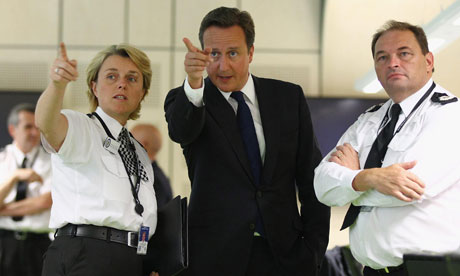
Although I understand the enthusiasm of politicians and communities for robust measures, excessive force will destroy our model of policing in the long term. What we must hang on to in all of this is the British model of policing, premised on human rights and the minimum use of force. We police with consent and must be professional, proportionate, fair and justifiable to the public at all times.
By Hugh Orde (The Guardian, UK)
Such tactics should only be used in very specific circumstances and we will not rashly deviate from the British model of policing
One of the greatest strengths of British policing is that operational decision-making is conducted not by politicians, but by professional chief police officers who have spent their whole career in policing. While David Cameron todayreferred to some of the more extreme measures available to us, they are not new, and responsibility for their deployment remains entirely a matter for chief officers. There can be no confusion here at all; it is a fact that we cannot be ordered to police in a certain way but we will be held robustly accountable for what we choose to do or not do.
As one of only two officers in the country to have ordered the use of water cannon and baton rounds in public-order policing, my professional judgment is it would be the wrong tactic, in the wrong circumstances at this moment. Both require an extremely precise situation. The use of water cannon, while logistically difficult, works against large stationary crowds throwing missiles at police or, as I witnessed in Northern Ireland, at other communities. It achieves distance between police and unlawful crowds that is often vital.
Utilising baton rounds, an even more severe tactic, is fundamentally to protect life. When I ordered their use, again in Northern Ireland, my officers were being attacked by blast bombs and live fire. I would always use both with a heavy heart, but it is always an issue of proportionality.
What we have seen so far from these riots, involving fast-moving and small groups of lawless people, is a situation that merits the opposite end of public-order policing.
This morning, myself and members of police forces around the country had the opportunity to share with the home secretary the tactics that are working and the evidence is that fast arrests, rapid processing of prisoners through the court system, making sure the correct charges are being placed and collecting appropriate evidence through proper, investigative practice, is working. Baton rounds and water cannon were not mentioned once.
Although the policing of disturbances in London on Monday has been widely criticised for lack of arrests, we have learned and moved on quickly from it.
Indeed, events on Monday posed unique difficulties for the deployed 6,000 officers – more than have ever policed an event in London. Making arrests at that time, although some did occur, would not have been sensible; we needed cops on the street to keep the peace and preserve life. We can deal with property loss and damage post-event, and while foresight is not always a commodity afforded to the police, part of any deal is that the police will have to explain themselves to the public.
What we have seen so far is not soft policing, and although I understand the enthusiasm of politicians and communities for robust measures, excessive force will destroy our model of policing in the long term. What we must hang on to in all of this is the British model of policing, premised on human rights and the minimum use of force. We police with consent and must be professional, proportionate, fair and justifiable to the public at all times.



No comments:
Post a Comment
Note: Only a member of this blog may post a comment.